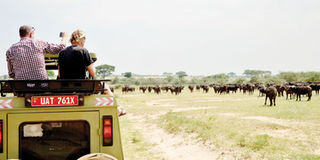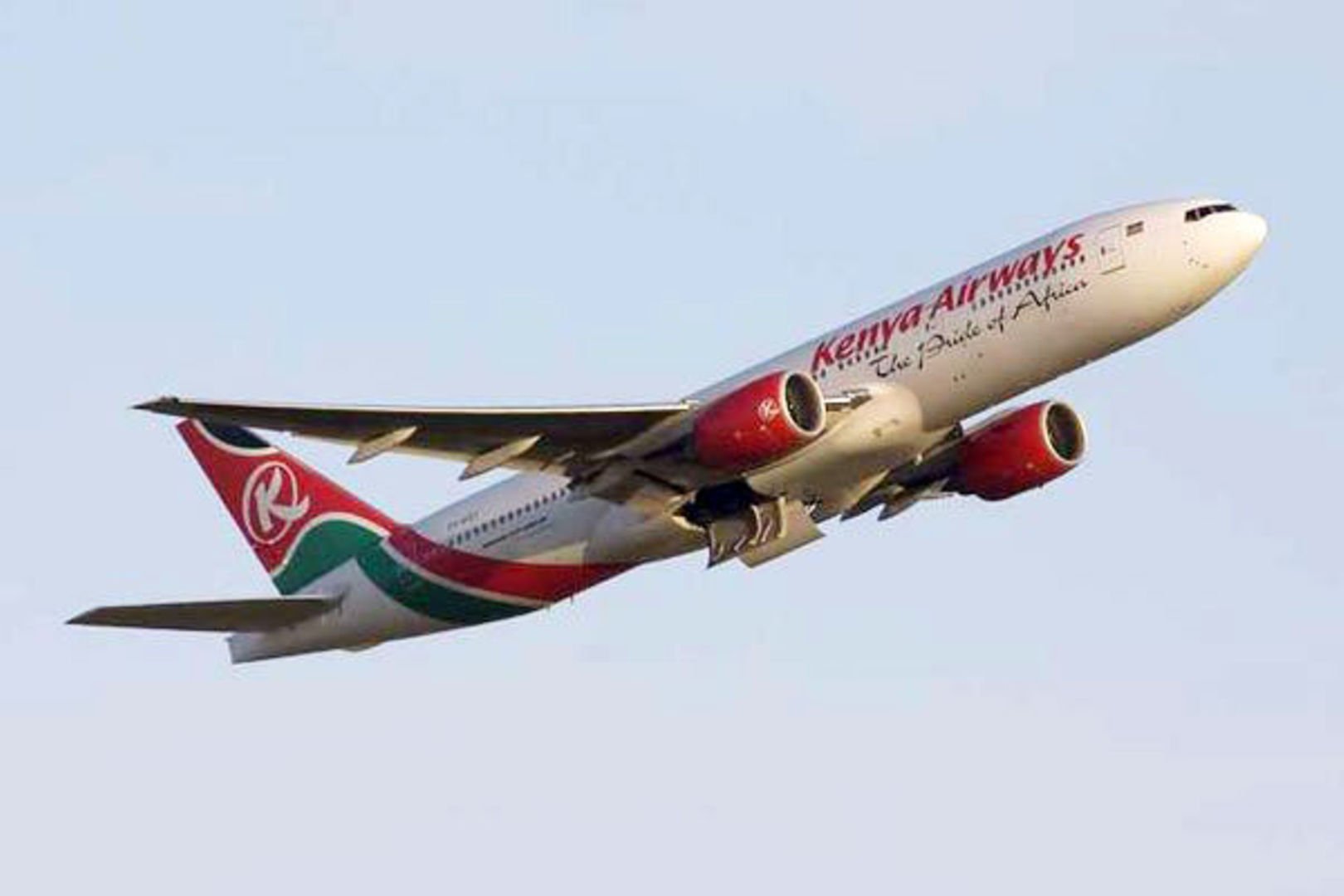Tourism: Uganda ends year healthier

Tourists enjoy a game drive at Murchison Falls National Park in western Uganda.
PHOTO BY DOMINIC BUKENYA
What you need to know:
Data from Uganda Tourism Board shows that tourism now contributes nearly 10 per cent to Uganda’s Gross Domestic Product. The tourism sector has posted growth in visitor arrivals, conference and business summits, as well as investments in tourist accommodation facilities, By Dorothy Nakaweesi writes.
Tourism, away from the sluggish growth that characterised the year, has made more gains.
Although 2018 has had some political disturbances such as the chaos that ensued after the Arua bi-elections, the tourism industry has withered through, registering some of the most impressive numbers in the period under review.
This has been achieved against all odds as some traditional source markets issued travel advisory, cautioning their citizens of the possibility of being caught up in pockets of violence.
The sector has posted growth in visitor arrivals, conference and business summits, as well as investments in the tourist accommodation facilities.
The sector has grown into an economic anchor for not only government but also socially, becoming a source of livelihood.
According to data from Uganda Tourism Board, tourism now contributes nearly 10 per cent to Uganda’s Gross Domestic Product. The sector fetched at least $1.45b (Shs5.4 trillion) in 2017, making it the country’s largest foreign exchange earner.
This figure is expected to double to Shs10 trillion ($2.4b) by 2020.
Patrick Bitature, a key private sector player in the hospitality and the Private Sector Foundation Uganda chairman, believes Uganda is on a good trajectory regardless of some little disturbances here and there.
“I think we are still not in control of the narrative. We are in such a strong position with so much potential yet to be unleashed,” he says.
Fundamentals
The key fundamentals Mr Bitature talks about, are an increasing interest in birding, the launch of new hotels - such as Skyz Hotel Naguru, Mestil, Golden Tulip and Pearl of Africa, among others.
Key on the agenda is to promote tourism through personalities whom Ugandans can relate with such as Zari Hasan, the current tourism ambassador and Eddy Kenzo, who served in the same capacity.
Government also recently said it was engaging three more market destination representatives to promote Uganda’s tourism in non-traditional markets such as China, Japan and the Gulf, among others.
It is marketing initiatives like these that attracted NatGeo recently to list Uganda among the 19 Cool tourism destinations set to hit headlines in 2019. NatGeo is a magazine published by the National Geographic Society in the US.
Gorilla permit impact
It is difficult to talk about tourism in Uganda without talking about the gorilla story.
The gorilla population is growing with the latest estimates putting the primates at 1,000 in the region which stretch through the Virunga Mountains covering Rwanda, Uganda and the DR Congo.
However, half of these perch in Uganda‘s Bwindi Impenetrable Forest.
Gorilla trekking costs $600 (Shs2.2m) and comes with at least eight hours of interaction with one of the rarest species.
Geoffrey Baluku, the director of Travel Media is cognizant of the heavy reliance of Uganda’s tourism on the primates. He, however, suggests that the country builds on this to harvest more from the sector.
“Many tour operators have opted for Uganda because Rwanda increased their gorilla permits from $750 (Shs2.8m) to $1,500 (Shs5.6m),” he says.
A gorilla permit allows a tourist to access a safari to Kidepo, Murchison, Kibale, or Queen Elizabeth.
So far, over 70 per cent of gorilla permits, according to information from Uganda Wildlife Authority (UWA)’s executive director, Mr Sam Mwandha, have been booked till June next year.
“Yes there is an increase in numbers and this has been the trend we have had over the years,” Mr Mwandha says.
Online marketing
Baluku says, online marketing and promotion of Uganda is ongoing.
According to information from UTB, government has been making inroads in emerging markets such as China, the Gulf States, Japan and the Nordic countries.
In an earlier interview UTB’s chief executive officer Stephen Asiimwe said: “We have asked for more resources to bring on board new PR companies to promote Uganda in emerging markets.”
At least Shs6b has already been requested for to contract marketing and destination representatives to market the country.
PHG Consulting, which works on behalf of Uganda in North America, Kamageo in UK and Ireland and KPRN for German speaking Europe has been doing a fine job and is pending contract renewal.
In an email, Tim Henshall, the chief executive of Kamageo says considerable success has been made “and there is more we could all be doing.”
He says due to limited budgets, they have had to concentrate on increasing trade support for Uganda which is now in place.
“It’s really time to start to talk more effectively to would-be travellers. But that requires bigger budgets, as we cannot rely on (free) social media to talk to the public,” Henshall shared.
Local campaigns
Beyond the international marketing, according to UWA’s Mwandha, efforts have been made to internally create services and products that can facilitate continued stay, return or referral of tourists.
“When a tourist lands at Entebbe Airport and is traveling –what is the reception at Entebbe? What is the status of our roads? What is the customer care at the hotels? Are the guides well equipped with information about Uganda to explain it well?” Mwandha questioned.
Tourism sector, he says has been diversifying products beyond national parks.
Aspects such as cultural attractions and leisure, he says, are being explored to extend the menu to other aspects.
During the 2017/18 financial year, the tourism sector organised or facilitated various domestic events and supported domestic campaigns such as Tulambule (let’s explore) with enhanced focus on popularising tourism sites as well as encouraging Ugandans to visit and experience the beauty of their own.
“Tulambule” creates awareness about the wonders of Uganda while promoting Uganda internationally. We have to appreciate it ourselves.”
However, the Tourism Ministry needs to “Ugandanise” it beyond Luganda because it locks outs other lingual speakers.
“Currently, Uganda has no known Brand as all taglines are scattered,” he says suggesting that other taglines in different languages must be coined and shared widely.
At one time, President Museveni directed the Ministry of Tourism to have the tagline ‘Uganda, the Pearl of Africa’ patented. But sadly over years five later, nothing has been done.
Accommodation
In the accommodation sector, the industry reported 4.2 per cent growth in the year 2017, which was strengthened by the entry of nearly 1,000 new bed capacities.
Jean Byamugisha, the executive director of Uganda Hotel Owner’s Association, concurs that 2018 was a good year for tourism and hotels.
“We saw the opening of new hotels in Uganda and this is mainly because we have concentrated on pushing Uganda as a MICE (Meetings, Incentives, Conferences, Events) destination,” Byamugisha shares.
The 1,000 extra rooms in Kampala alone, she says, shows that members have prepared to tap into the opportunity that comes with MICE.
“We are looking to diversify the tourism products of our country and MICE is one of the fastest growing segments in the tourism industry,” she added.
MICE has established a bureau that markets the country across the world to attract international conferences.
UHOA in partnership with the US embassy sent a 20-man delegation to Chicago to visit hotels, network and create business linkages.
According to UHOA, this has seen some international hotels express interest to partner with local hotel owners to upgrade their facilities to international standards.
“You will see more international chain hotels opening up shop in Uganda with two big ones set to open in the first two months of the year,” Ms Byamugisha says.
Challenges in tourism industry
obstacles
However, the industry is still experiencing several obstacles such as lack of skills development.
“We have many young people looking for jobs but failing to be absorbed in the sector due to lack of the required skills,” Ms Byamugisha shares.
The hospitality sector is still burdened by multiple taxation, especially in upcountry facilities.
The hotels pay 12 different taxes most of which are replicated such as the local service tax, hotel tax under which they pay for licences, conference licence, and Occupational Safety Tax.
Byamugisha says: “Although we have lobbied under the Presidential Investors Round Table for the removal of VAT especially on the upcountry hotels that don’t have as much business as the Kampala hotels, this has failed.”
This means to break even, they have to charge a bit higher, which makes Uganda an expensive tourist destination.
Negative press has also led to some cancellation of international bookings which affects the hospitality sector.
Some hotels have had to refund tourists who cancel trips because of political and health disturbances.
Travel advisories
Travel advisories can be a menace to tourism and have long term effects.
Beyond travel advisories, tragedies such as the recent sinking of a boat off Lake Victoria, have adverse effects and will for long impact tourism numbers especially to island resorts such as Kalangala. Therefore, whenever there are such disturbances, the tourism industry and the country loses.
Coffee tourism
Coffee is a priority commodity for Uganda, generating approximately 18 to 20 per cent of our foreign exchange over the past 20 years while contributing to the income of millions of rural households.
On the other hand, tourism is the highest foreign exchange earner. Therefore, combining these two priority sub-sectors will have a positive impact on the Ugandan economy which grew at 5.5 per cent last Financial Year, 2017/18 and is now well over 6 per cent,” said Prime Minister Dr Ruhakana Rugunda.
Marketing
Uganda has an abundance of tourist attractions. But there must be increased awareness of the overall offering. Mountain gorillas are the biggest draw.
“We must avoid Uganda becoming a “gorilla express” where visitors stay just 48 hours in Bwindi, tagging it on to the end of a Serengeti safari. Uganda is a true destination, not just an activity,” Mr Tim Henshall, chief executive, Kamageo said.
The travel trade in the UK has certainly taken Uganda to its heart. An extra 50 UK tour operators now sell Uganda, which is a terrific increase.
At the same time, “We’ve surveyed all UK operators and 80 per cent are stating that enquiries and bookings for Uganda are on the increase,” Mr Henshall said
Performance
According to data from Uganda Tourism Board, tourism now contributes nearly 10 per cent to Uganda’s Gross Domestic Product. The sector fetched at least $1.45b (Shs5.4 trillion) in 2017, making it the country’s largest foreign exchange earner.
This figure is expected to double to Shs10 trillion ($2.4b) by 2020.




